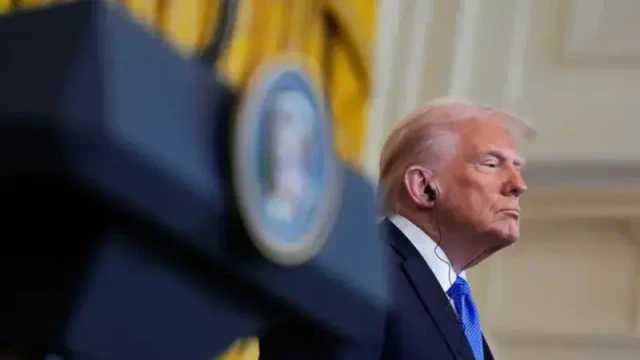
Photo: Collected
"President Trump signs a memorandum on Thursday, directing his administration to pursue reciprocal tariffs against countries imposing fees on U.S. exports, escalating the ongoing trade dispute."
Washington, Feb 14, (V7N) − President Donald Trump signed a memorandum on Thursday directing his administration to pursue reciprocal tariffs against countries that impose fees on U.S. exports, escalating the ongoing trade war. This move could result in higher costs for American consumers.
While no tariffs were immediately applied, the President instructed trade officials to review each country individually and develop tailored countermeasures. The goal is to impose tariffs that are equivalent to the fees imposed by other countries on U.S. products, including taxes, tariffs, and regulatory requirements affecting American businesses.
"Whatever they charge us, we're charging them," Trump said during the announcement, referring to the new approach as a "beautiful simple system."
Initially, Trump had suggested imposing across-the-board tariffs on all nations, but he changed course last week, opting instead for a more targeted, reciprocal tariff policy. The revised approach is focused on addressing the value-added tax (VAT) used by some nations, which adds costs to U.S. exports.
The Secretary of Commerce and U.S. Trade Representative will lead the process, working with other key members of Trump’s economic team, including the Treasury and Homeland Security secretaries. The countries with the highest trade deficits will be reviewed first, with the most egregious trade practices being targeted in the coming weeks.
The move aims to open dialogue with U.S. trade partners and could lead to tariff reductions if another country agrees to lower its fees.
Trump recently imposed a 25% tariff on steel and aluminum imports and hinted that he would review additional tariffs on products such as automobiles, pharmaceuticals, and computer chips within the next four weeks. These tariffs have stirred tensions with U.S. partners and Democratic lawmakers who argue that they may harm American workers instead of helping them.
The administration is also preparing a report to assess the fiscal impacts of these actions, with Office of Management and Budget Director Russell Vought overseeing the project. However, the report is more of a requirement than a review that could lead to changes in policy.
Trump’s authority to impose these tariffs is grounded in the Trade Expansion Act, which allows him to take action for national security reasons, as well as the International Emergency Economic Powers Act, which permits the regulation of imports during a national emergency.
Trump has specifically singled out the European Union, which had a trade deficit of $235.6 billion with the U.S. in 2024, and its use of VAT as a barrier to U.S. exports, particularly in the automobile sector. VAT is a consumption tax levied on goods and services throughout their production stages, with consumers ultimately bearing the cost.
More than 170 countries globally use VAT to generate revenue, with rates varying by region. The average VAT rate worldwide is around 15%, with Europe averaging 20%.
Trump has argued that countries have been taking advantage of the U.S. through trade deficits and emphasized the need for "reciprocal" actions.
Since taking office, Trump has raised tariffs on China and paused tariffs on Mexico and Canada in exchange for concessions related to immigration and fentanyl.
This new trade policy reflects Trump’s desire to ensure fairness and better terms for U.S. industries in international trade agreements.
END/SMA/NYC/AJ/

Comment: